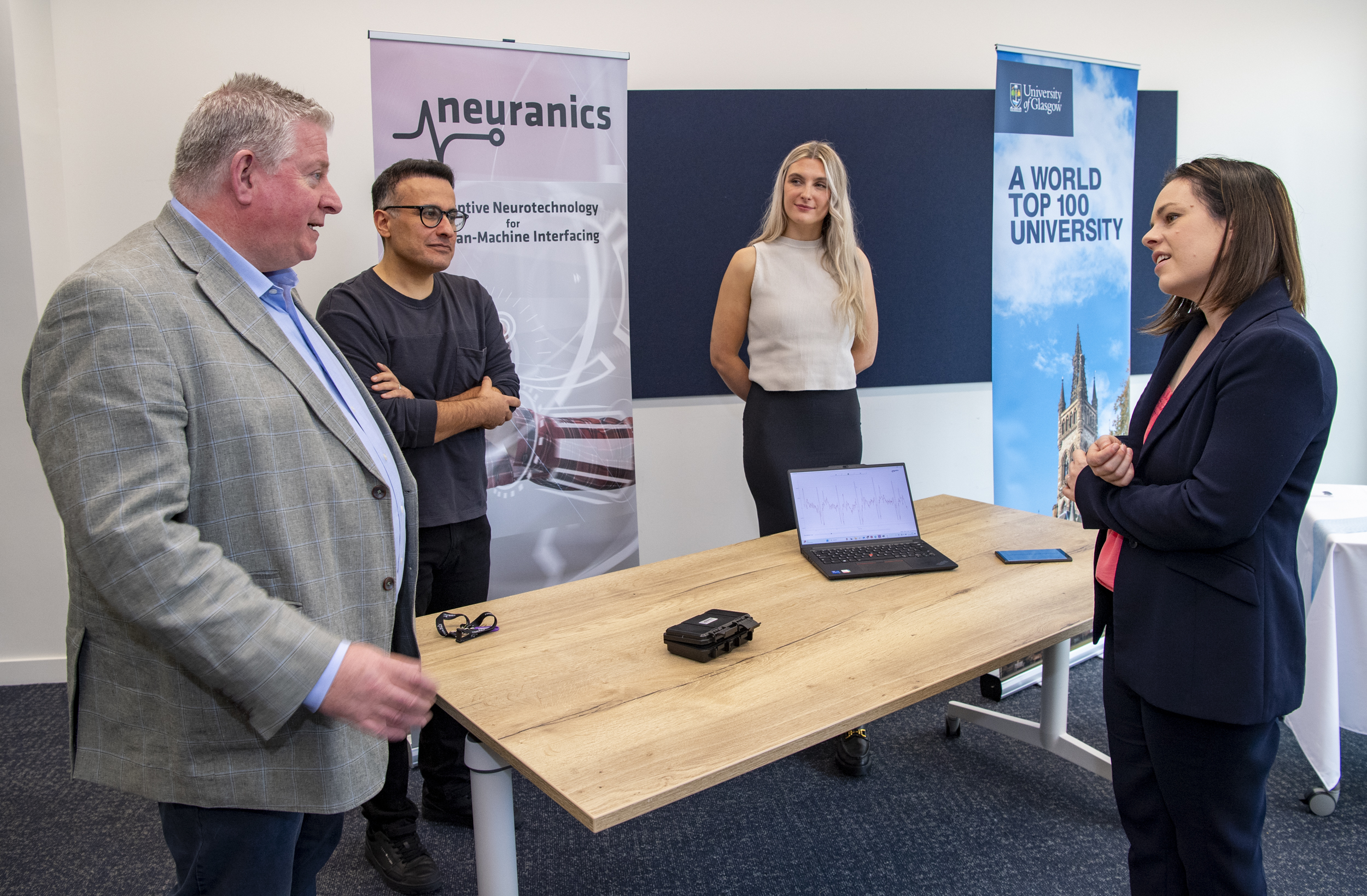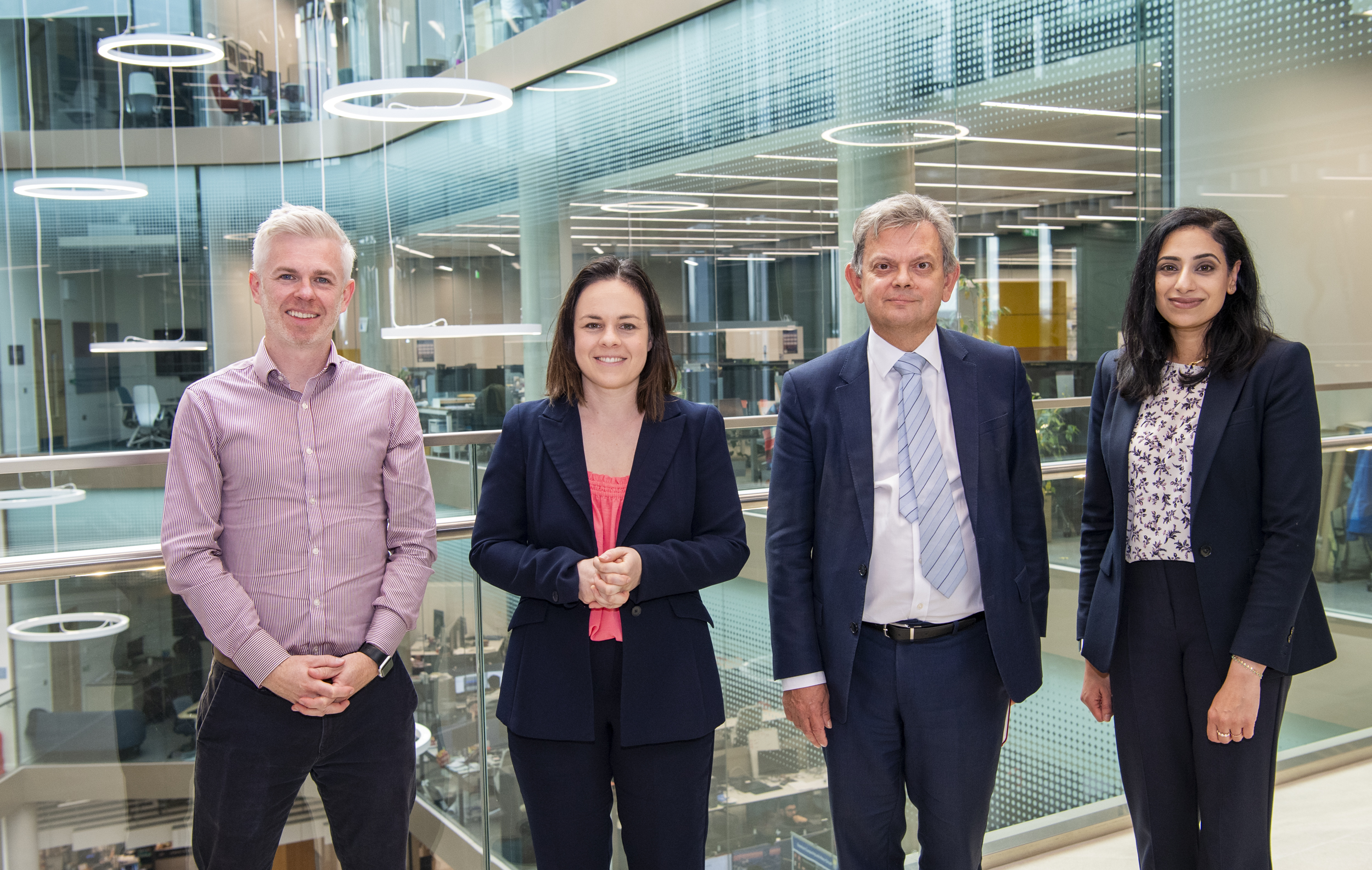
Deputy First Minister meets University spin-outs
The Deputy First Minister has learned first-hand about the impact spin-out companies at the University of Glasgow are having on the Scottish economy.
Kate Forbes MSP, who is also Cabinet Secretary for the Economy, met the founders behind two companies when she visited the Mazumdar- Shaw Advanced Research Centre (ARC building) this week at the new Western campus, which sits within Glasgow Riverside Innovation District.
Neuranics and Nami Surgical, which spun-out from the University in 2021 and 2022 respectively, are just two of the successes in a growing portfolio of young high-growth ventures emerging from discovery science and innovation at the University.
Nami Surgical has developed a high-performance, miniaturised ultrasonic scalpel, designed to revolutionise and improve patient outcomes through robotic-assisted surgery, while Neuranics has developed magnetic sensors integrated with quantum sensing technology for health, fitness, and metaverse applications.
Ms Forbes met Noel McKenna, Professor Hadi Heidari and Rhianna Sweeney from Neuranics, along with Dr Nico Fenu and Dr Rebecca Cleary from Nami Surgical.
Innovation
The Deputy First Minister took a tour of the state-of the-art labs in the ARC before discussing the University’s approach to collaboration, innovation, and inclusive economic development with the Principal and Vice-Principal for Economic Development and Innovation.

Ms Forbes heard about Glasgow’s new Innovation Strategy and how developments within the Glasgow Riverside Innovation District (GRID) are creating local jobs and driving economic growth for Scotland.
The discussions also focused on the University’s support for entrepreneurship and commercialisation, and the significant investments made to support commercialisation and translation of research, including the recently-launched £500,000 UofG MedTech Innovation Fund.
Deputy First Minister Kate Forbes said: “A growing, thriving economy is built upon innovation and entrepreneurship, and our universities and their research centres play a pivotal role in not just partnering and supporting our start-up community, but founding and scaling successful spinout companies.
“I was delighted to meet first-hand two such spinouts at the ARC. These companies have taken their academic research and created cutting-edge technological innovations which are now creating well paid jobs, attracting partnerships with industry and contributing to the local and national economy.
“I was also pleased to discuss the contribution the University is making to our national innovation priorities through its own new Innovation Strategy, and the leading role it is playing within economic development of the Glasgow region. Initiatives such as the Glasgow Riverside Innovation District are helping to reinvigorate the Govan area by creating jobs, attracting inward investment and advancing health innovations all the while involving the local community.”
Uzma Khan, Vice Principal for Economic Development & Innovation, said: “We were delighted to host the Deputy First Minister, where she was able to speak to two of our high-potential spin-out companies.
“The University of Glasgow has a strong pipeline of quality spin-outs which are committed to creating jobs and improving societal outcomes through excellent research and discovery science.
“Through our Innovation strategy, we have ambitious plans to unlock the vast potential of our University to the benefit of our city region, Scotland and beyond.
"Our Glasgow Riverside Innovation District provides a key opportunity for us to connect to regional economic strengths and clusters, and in ensuring we develop an approach where our communities can benefit through our mission.”
The University of Glasgow has a strong pipeline of quality spin-outs which are committed to creating jobs and improving societal outcomes through excellent research and discovery science
Uzma Khan
Professor Sir Anton Muscatelli, Principal and Vice-Chancellor said: “The University was pleased to host the Deputy First Minister to see first-hand how our role as a major anchor institution in the west of Scotland is catalysing research, innovation, knowledge exchange and collaborations with industry and local communities, which is in turn driving economic impact across Scotland.
“It was great to discuss the Scottish Government’s support for entrepreneurship in universities and the important role Glasgow can play by being at the forefront of several key sectors for the economy- from life sciences and quantum technologies to 5G and MedTech.
“As the Scottish Government progresses its plans for growth, there will be a key role for Universities like Glasgow to play in boosting productivity and attracting international investment.”
The University of Glasgow has 22 spin-outs that are deemed high and medium potential, with around half of those ventures said to have global impact potential. To date, 190 jobs have been created across 10 of the University’s scalable spin-out ventures.
Dr Rebecca Cleary, co-founder and Chief Technical Officer, Nami Surgical, said: “We were thrilled to welcome the Deputy First Minister to the University of Glasgow. As a proud spin-out from this esteemed institution, we are advancing medical technology while contributing to the growth of a Scottish company.
“By generating high-paying jobs and upskilling local talent, we are committed to driving innovation and economic development right here in Scotland.
“With the Deputy First Minister’s dedication to fostering economic growth and innovation, her visit highlights the vital connection between industry, policy, and academic research that drives meaningful progress.”

Neuranics CEO Noel McKenna said: "It was an honour for the Neuranics team to meet the Deputy First Minister of Scotland to discuss university spin-outs and their vital role in fostering innovation and economic growth in Scotland, and to showcase our cutting-edge magnetic sensing solutions powered by Tunnelling Magnetoresistance (TMR) technology.
"The Deputy First Minister expressed keen interest in our innovative contributions in areas like health monitoring and wearables, highlighting the importance of collaboration between academia and industry.
"At Neuranics, we are driven by a vision to revolutionise human-machine interaction. Our goal is to create seamless connections that empower industries and unlock the immense potential of magnetic sensing."
- Main image: With Nami Surgical, Dr Rebecca Cleary, DFM Kate Forbes MSP, and Dr Nico Fenu. Second image: With Neuranics, CEO Noel McKenna, Professor Hadi Heidari, Rhianna Sweeney and DFM Kate Forbes MSP. Third image: Dr John Harris, Interim Director of Research Services and Head of Operations at ARC; DFM Kate Forbes MSP; Professor Sir Anton Muscatelli, Principal and Vice-Chancellor, University of Glasgow; and Uzma Khan, Vice Principal for Economic Development & Innovation, University of Glasgow.